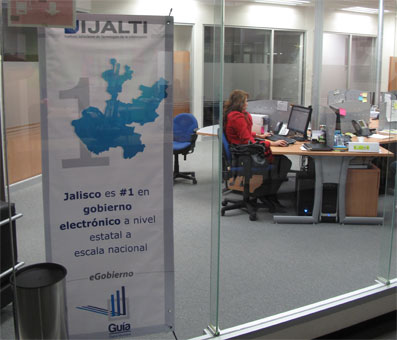Mexico is quietly emerging as a capital of Latin America’s growing information technology (IT) outsourcing industry.
More than 600,000 people already work in IT, with another 65,000 new professionals graduating each year from the dozens of technical and engineering schools clustered throughout Mexico. The industry includes more than 2,000 IT companies, ranging in size from start-ups to veterans like Hildebrando, Softek, HP, IBM, and Intel.
At the center of Mexico 2.0 is Guadalajara, the capital of the state of Jalisco, located in the agave cactus lined hills six hours north of Mexico City.
Tech entrepreneurs from across Mexico come to the city’s Centro del Software project—an “incubator” for small-scale tech start-ups. Established in 2006, there are now 34 companies and 700 people working in the Centro del Software. The government provides the nascent tech companies with subsidized rent as well as technical and business advisory services. Each company works with the Instituto Jalisciense de Tecnologías de la Información (IJALTI), whose mission is to promote the city’s expanding IT and business process exporting (BPO) sectors. The start-ups also pool resources and collaborate to handle projects for large, global clients.
Success is on its way. In spite of the troubles in the global economy, tech companies in Guadalajara are winning new clients and expanding their businesses. Collectively, they are part of the reason why President Felipe Calderón recently recognized Guadalajara as a “Creative Digital City.”
Local entrepreneurs agree. During a recent visit to the Centro del Software, Jesus Michel, an executive at IBM de Mexico, told me that due to a “triple play of collaboration between the government, private businesses and universities Guadalajara is becoming the Silicon Valley of Mexico.”
However, the city’s burgeoning IT industry must grapple with more than just the occasional computer glitch. Even though it has always been considered to be a relative safe haven from cartel violence, Guadalajara suffers from an international perception that all of Mexico is dangerous.
From a marketing standpoint, security is a top concern at the Centro del Software. Tech entrepreneurs as well as government representatives have had to learn crime statistics to allay visitors’ concerns about safety.
Kurt Rodriguez, a representative from the Jalisco state economic development office told me Guadalajara “is nothing like Monterrey [or] Juárez,” both of which sit closer to the U.S. border and are often the final Mexican stop for U.S.-bound drugs.
“It’s not like other places [in Mexico],” explained Carlos Cevallos, the CEO of iGATE Global Solutions Mexico Ltd, a business that offers IT support and services to clients throughout the Americas.
“Executive kidnappings, it’s not something that’s happening,” Kurt interjected, adding another detail to the well-rehearsed presentation.
Though clearly part of a carefully honed sales pitch, these statements reflect a broader consensus on the security situation in the city. Shannon O’Neil, a Mexico expert from the Council on Foreign Relations, agreed, telling me that “Guadalajara has yet to become as violent as places such as Juárez or Monterrey.” Businesses are continuing to invest in the city, despite a recent uptick in violence in the surrounding state of Jalisco.
Gerardo Rodriquez, a recently graduated PhD economist who works as the director of innovation at IJALTI, took me on a tour of the first floor of the Centro del Software, a building that has the feel of a Silicon Valley startup. Glass windows allow visitors to peer into the small offices of different start-ups in the “incubator” part of the building. Inside the offices, teams of young professionals work at computers, developing video games, designing websites and helping engineering companies handle quality control. Though one of the glass walls of another start-up I saw a pool table, a prop that seemed at home in the center. It’s an environment that “seeks out the creativity in the people,” Gerardo said.
We looked in the window of MasFusion, another start-up. There, I saw Eduardo Flores, a spikey haired 25-year-old video editor, leaning in front of a large computer screen, chatting with another young employee. After getting his degree from Tecnológico de Monterrey’s satellite campus in Guadalajara, Eduardo has focused on 3D animation and producing media for global brands like New Balance. He said the center promotes collaboration not just between the start-ups, but also inside the office.
“If you’re not on Twitter or Google Chat, you miss a lot,” Eduardo told me.
Inside the office, I met Angel Banuelos, one of the company’s cofounders. We walked past a row of large-screen computers into a conference room that featured an artificial grass carpet and low black leather seats.
Angel, a high-energy thirty-something entrepreneur who spends part of his time teaching at Tecnológico de Monterrey, Mexico’s most prestigious engineering school, and makes several trips a year to conferences in the U.S. and Europe, never stopped moving during my talk with him. Through the glass door of the small conference room I could see photos of Times Square hanging on the wall behind a row of large screen iMac computers.
“What we sell is innovation, MasFusion is a creative agency in digital media… the people who work here have to be in a creative environment,” he said, speaking rapidly, fidgeting his foot on the green carpet. He has 32 employees who develop mobile apps, handle customer support and produce videos. Collaboration is encouraged.
He founded the business eight years ago with two friends, both of whom were already working freelance in the media sector. Originally, they worked in isolation out of a small office. Now, he’s surrounded by government advisors, start-ups with experience handling larger clients and access to private investors. In addition to its work for private companies, MasFusion has helped produce videos that the state government uses to promote the expanding tech sector. His latest project is MadeinSocial, a company that advises businesses on how to learn about and engage their customers through social media.
“The Centro del Software is an ecosystem,” he said, a place to learn the real world business skills that are hard to acquire in a classroom. Seeing other examples of success has helped build the confidence of young entrepreneurs in the Centro. “It’s helped a lot to see other [businesses] working with big clients,” Angel said.
Thanks in part to its emerging tech sector, Guadalajara’s economy is taking off. Carlos Ramirez, an analyst at the Eurasia Group, an emerging markets consultancy, explained that in the last few years, when it comes to the IT sector, “Guadalajara has become a very successful niche for those types of exports to the U.S.”
Still, the city is caught in the same paradox as the rest of the country—a positive assessment of its strong economic vital signs is marred by troubling incidents of cartel violence. A few weeks before my visit to Guadalajara, police found two dozen headless bodies dumped in the center of the city, a sign of possible escalation in the nationwide dispute between Mexico’s two most powerful cartels.
“The peace that Jalisco enjoyed before 2009 is certainly not there anymore,” Carlos Ramirez said, “but Guadalajara is still a relatively peaceful area. Businesses haven’t been targeted.”
It is also at the center of efforts to build a new image for Mexico. Still, two different forces are at work, trying to define Mexico 2.0. In spite of the cartel violence that has been creeping into Guadalajara, the young professionals in the Centro del Software are continuing to work to develop the city’s IT sector.
“I like this [job], the creative part, generating content,” Eduardo, the video editor told me.








